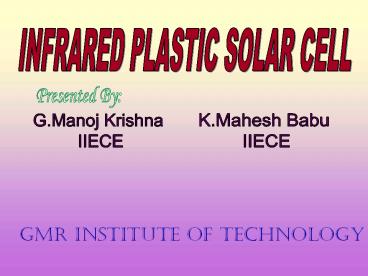Nanotechnology - PowerPoint PPT Presentation
Title: Nanotechnology
1
INFRARED PLASTIC SOLAR CELL
Presented By
K.Mahesh Babu IIECE
G.Manoj Krishna IIECE
- GMR INSTITUTE OF TECHNOLOGY
2
INTRODUCTION
- Solar energy plays a major role in present days.
- It is renewable source of energy.
- This presentation is about the new type of solar
cell. - It is 5 times efficient than conventional solar
cells.
3
NANOTECHNOLOGY
- Nanotechnology is about building things atom by
- atom, molecule by molecule.
- Nanotechnology is billionth of a matter.
- It is defined as the study of functional
structures with dimensions in the range of 1-100
nanometer.
4
Working of solar cell
- These are photovoltaic (PV) cells based on
crystalline silicon. - It absorbs visible sunlight and transferred to
the semiconductor material. - This energy knocks electrons to flow freely,
which results current. - Current is drawn from the metal contacts in PV
cell.
5
FIGURE SHOWING THE WORKING OF SOLAR CELL
6
Why Nanotechnology in solar cell
- The conventional solar cells are less efficient.
- Their efficiency is very poor in cloudy days.
- To overcome above problems, A new type of solar
cell embedded with NANOTECHNOLOGY is developed,
which is INFRARED PLASTIC SOLAR CELL.
7
Division of sunlight
Sun
Visible
Infrared
Earth
8
INFRARED PLASTIC SOLAR CELL
- A plastic solar cell can turn the suns power into
electric energy even on a cloudy day.
9
- It uses specially designed nano particles called
quantum dots.
QUANTUM DOT
10
- The quantum dots with a polymer to make the
plastic that can detect energy in the infrared.
QUANTUM DOT LAYER
11
INFRARED PLASTIC SOLAR CELL
- This plastic material can harness the suns
invisible infrared rays. - These plastic solar cells can be taken
everywhere. - It reduces the need to PLUG IN for power.
12
WORKING OF PLASTIC SOLAR CELL
- It requires semiconductor nanorods (7 nm by
60nm).
- The heart of a solar cell is a 200-nm-thick film.
- It consists of cadmium selenide (CdSe) nanorods
and blended with P3HT(poly-3hexylthiophene).
13
- A layer only 200 nanometers thick is sandwiched
between electrodes. - It can produce 0.7V at present
14
- Aluminium coating acts as the back electrode .
- When nanorods absorb light they generate an
electron and an electron hole. - Electron is collected by alluminium electrode.
- The hole is transferred to the plastic and
conveyed to the electrode, creating a current.
15
IMPROVEMENTS
- Better light collection and concentration
employed in the solar cells. - In plastic cells nano rods are closely packed and
transfer their electrons more directly to the
electrolyte. - They also hope to tune the nano rods to absorb
different colors to span the spectrum of sun
light.
16
APPLICATIONS
- Telecommunication systems
- Radio transceivers on mountain tops, or telephone
boxes in the country can often be solar powered.
17
- Hydrogen powered car
Hydrogen car painted with the film could convert
solar energy into electricity to continually
recharge the cars battery
18
- Coating the cell
- Chip coated in the material could power cell
phone - A couple of drops if the titanium dioxide
suspension is then added. - The slide is then set aside to dry for one
minute.
19
Ocean navigation aids
Ocean navigation aids many lighthouses and most
buoys are now powered by solar cells.
20
ADVANTAGES
- These are considered to be 30 more efficient.
- Their efficiency is same even on cloudy days.
- These are very compact and more practical in
application. - These cells avoids effects like pollution.
- Fabrication is easy.
21
LIMITATIONS
- They are very costly.
- Relatively shorter life span when continuously
exposed to sunlight. - It requires higher maintenance and constant
monitoring.
22
CONCLUSION
- Plastic solar cells help in exploiting the
infrared radiation. - More effective when compared to conventional
solar cells. - They can even work on cloudy days.
- Though at present cost is a major drawback, it
can be solved in the near future.
23
REFERENCES
1.Introduction to NanotechnologyCharles P
Poole,Frank J Owens
2.Nanomaterialssynthesis,properties and
applicationsEdelstein, A.S.cammarata
3.Solar energy-fundamentals, design, modeling,
applications G.N.Tiwari
24
QUERIES ???
25
Thank you































